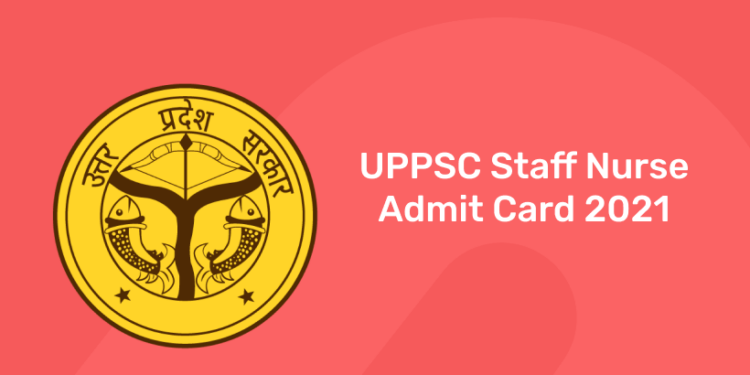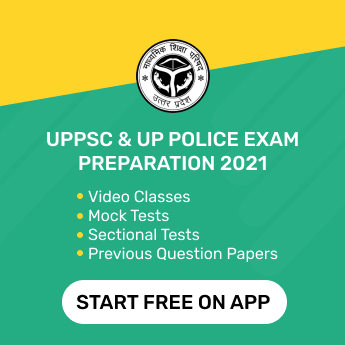Table of Contents
UPPSC Staff Nurse Admit Card 2021 Out: Uttar Pradesh Public Service Commission (UPPSC) has released the admit card for the UPPSC Staff Nurse position. The candidates who had applied for the exam can now check the official website and download the admit card. The admit card is released by the UPPSC on 22 September, 2021. Candidates can download the admit card now and ensure the details mentioned in the admit card is error free before the exam. Download the UPPSC Staff Nurse Admit Card here.
Click here to download the UPPSC Staff Nurse Admit Card 2021
 UPPSC Staff Nurse Admit Card 2021
UPPSC Staff Nurse Admit Card 2021
The Uttar Pradesh Public Service Commission recently released 3012 vacancies for male & female Nurse staff.. The UP Public Service Commission will conduct the exam on 3rd October 2021. Aspirants can download the UPPSC Staff Nurse Admit Card from the UPPSC web portal and appear for the written exam. The Uttar Pradesh PSC Staff Nurse Exam will be conducted in online mode. Applicants are required to prepare well to qualify and ace the upcoming exam. The examination authority generally releases the UPPSC Staff Nurse Hall Ticket just before 10 days from the commencement of the written exam.
| UPPSC Staff Nurse Admit Card 2021 |
|
| Events | Dates |
| UPPSC Staff Nurse Admit Card | 22nd September 2021 |
| UPPSC Staff Nurse Exam Date 2021 | 03rd October 2021 |
| UPPSC Staff Nurse Result 2021 | November 2021 |
UPPSC Staff Nurse Overview
| Events | Details |
| Name of the conducting authority | Uttar Pradesh Public Service Commission (UPPSC) |
| Name of the Post | Staff Nurse |
| Official Website | uppsc.up.nic.in |
| Location | Uttar Pradesh |
| Exam Date | 3 October 2021 |
| No. of vacancies | 3012 |
| Category | Admit Card |
Click here for more updates on Government exams
How to Download UPPSC Staff Nurse Hall Ticket?
Follow the simple steps discussed below to download the Staff Nurse admit card.
- Firstly, visit the official site of UPPSC.
- Now search for the Admit card of UP Staff Nurse 2021 link.
- Click on the same link.
- Fill in all the required details asked in it like the registration no & Date of Birth.
- Now hit the submit tab to view your hall ticket.
- The UP Staff Nurse Admit Card will now appear on the screen.
- Download the hall ticket & Save it for further use.
- It is recommended that you take the printout of the hall ticket.
Documents Required Along With the Staff Nurse Admit Card
- Aadhar Card
- PAN Card
- Driving License
- Passport
- Voters ID
- College ID
- Any other ID proof issued by the Gazetted Officer
UPPSC Staff Nurse Exam Pattern
Exam Pattern for the Uttar Pradesh PSC Staff Nurse (Male/ Female) written exam is as follows:-
- Written Exam which is of multiple choice objective type.
- Written Exam comprises of 85 Marks in total.
- Time Duration for the written exam is 02 Hours (120 Minutes).
- For every wrong answer, one third (0.33) of the marks which is assigned to that particular question will be deducted as a penalty.
| Section Name | No. of Questions to be asked |
| General Knowledge | 30 Questions |
| General Hindi | 20 Questions |
| Main Subject Nursing | 120 Questions |
| TOTAL | 170 Questions |
Attempt our free current affairs Mock Test
UPPSC Staff Nurse Syllabus 2021
Exam Syllabus for UPPSC Staff Nurse Male/ Female is as follows :
General Knowledge –
History of India and Indian National Movement:- In History the main focus should be on a broad understanding of the social, economic and political aspects of Indian history. In the Indian National Movement, the aspirants are expected to have a synoptic view of the nature and character of the freedom movement, growth of nationalism and also attainment of Independence.
Indian and World Geography:- Physical, Economic and social geography of India and the World:- In World Geography only a general understanding of the subject will be expected. Questions on the Geography of India will be related to the Physical, Social & Economic Geography of India.
Indian Polity and Governance:- Constitution, Panchayati Raj, Public Policy, Political System, Rights Issues, etc:- In Indian Polity, Economic and Culture-based, questions will test knowledge of country’s political system which includes Panchayati Raj and Community Development, broad features of the Economic policy in India and Indian Culture.
Economic and Social Development:- Sustainable Development, Inclusion, Demographics, Poverty, Social Sector initiatives, etc. The aspirants will be asked questions with respect to problems and the relationship between Population, Environment and Urbanization. General matters on Environmental ecology, Bio-diversity and Climate Change – which do not require subject specialization. General awareness of this subject is expected from candidates.
Current events of national and international importance:- Candidates will be expected to have knowledge on the current events of National and International importance.
Indian Agriculture:- The candidates are expected to have a general understanding of agriculture in India, agricultural produce and its marketing.
General Science:-Questions on General Science will cover general topics and understanding of Science including matters related to everyday observation and experience, as may be expected of a well-educated person, who hasn’t made a special study of any scientific discipline. This area also includes questions on the role of science and technology in the development of India. One important point to be noted is that the candidates are expected to have a general awareness about the above subjects with special reference to the state of Uttar Pradesh.
ELEMENTARY MATHEMATICS (UP TO CLASS X LEVEL)
(1) Arithmetic:-
(i) Number systems: Natural Numbers, Integers, Real numbers, Divisors of an Integer, prime integers, rational and irrational numbers, L.C.M. and H.C.F. of integers and their interrelationship.
(ii) Average
(iii) Ratio and proportion
(iv) Percentage
(v) Profit and Loss
(vi) Simple and Compound interests
(vii) Work and Time.
(viii) Speed, Time and Distance
(2) Algebra:-
(i) Factors of polynomials, L.C.M. and H.C.F. of polynomials and their interrelationship, quadratic equations, Remainder theorem, simultaneous linear equations.
(ii) Set Theory: Set, null set, subsets and proper subsets of a set, Venn diagram,
operations (Union, Intersections, difference, symmetric difference) between sets.
(3) Geometry:-
(i) Constructions and theorems regarding triangle, rectangle, trapezium square, and circles, their perimeter and area.
(ii) Volume and surface area of the sphere, right circular cylinder, right circular Cube and Cone.
General Knowledge :
सामान्य हिंदी (हाईस्कूल स्तर तक) के पाठ्यक्रम में सम्मिलित किए जाने वाले विषय
(1) हिंदी वर्णमाला, विराम चिन्ह
(2) शब्द रचना, वाक्य रचना, अर्थ,
(3) शब्द-रूप,
(4) संधि, समास,
(5) क्रियाएँ,
(6) अनेकार्थी शब्द,
(7) विलोम शब्द,
(8) पर्यायवाची शब्द,
(9) मुहावरे एवं लोकोक्तियाँ
(10) तत्सम एवं तद्भव, देशज, विदेशी (शब्द भंडार)
Nursing –
- Anatomy & Physiology: Skeletal System, Muscular System, Digestive System, Excretory System, Cardio-Vascular System, Respiratory System, Nervous System, Endocrine System, Reproductive System and Sense Organs.
- Fundamentals of Nursing: Nursing as a profession, Maintenance of therapeutic Environment, The Dying Patient, Hygienic needs and Physical needs, Nursing Process and Nursing Care Plan, Admission and Discharging of a Patient, Activity and Exercises, Safety needs, Elimination needs, Observation of Patient, Care of Equipment, Barrier Nursing, Care and special condition, Meeting nutritional needs, administration of drugs, Recording and Reporting.
- First Aid: Meaning and Rules of First Aid Emergency situation such as Fire; Earthquakes; Accident; Poisoning; Drowning; Hemorrhage; Famines; Fractures; Insects bites; Foreign bodies Transportation of the injured, Bandaging and splinting, Immediate and later role of nurse
- Medical-Surgical Nursing: Role and Responsibilities of Nurse in Medical and Surgical Setting, Anesthesia, Diseases of Cardiovascular System, Gastro-Intestinal System, Care of Surgical patient, Genito Urinary System and Nervous System. Disorder and Diseases of the Respiratory System, Musculo-Skeletal System. Blood Disorder and Blood Transfusion. Endocrine System, Metabolic disorders, deficiency diseases: Hyper and Hypo Secretions, Cysts/Tumors, Diabetes Mellitus, Obesity Gout. The diseases of skin, Ear, Nose and Throat. Diseases and Disorder of Eye, Intensive care Nursing. Common deficiency diseases, Prevalence in India, Early symptoms, prevention and treatment. Communicable Diseases: Virus, Bacteria, Zoonoses and Mosquito.
- Psychiatric Nursing: Introduction, Management and Role of the Nurse, Community Responsibility, Diagnosis.
- Community Health Nursing: Concept, Definition of Community Health, the difference between- Institutional and community health nursing, Aspects of Community Health Nursing, qualities and function of community health nursing Demography and Family Welfare.
- Health Team: Composition at Community Health Centre (CHC), Primary Health Centre (PHC); Sub-Centre. Role of Nursing Personnel at Various levels: Male & Female Health Worker, Public Health Supervisor, Heath Supervisor, Public Health Nurse, Vital Health Statistics. Health education and communication skills.
- Midwifery and Gynecological Nursing: Introduction and Definition, Normal Pregnancy, antenatal exercises, Prenatal care, Care and advice regarding diet in pregnancy, Minor disorders of pregnancy and alleviation of discomfort.
- Diseases associated with pregnancy Normal Delivery Preparation: Normal labour – First stage, Second stage and Third stage of labour, Nursing Management of the mother during the puerperium, Nursing Management of Baby and birth, Complication of pregnancy and its management, High-risk pregnancy and its management, Obstetrics operations, Drugs used in Obstetrics, Labour Complications, Complications of puerperium and its management, Ethical and legal aspects related to midwifery and Gynecological Nursing, Fertility and Infertility Diseases and disorders of the female reproductive system including breasts.
- Pediatric Nursing: The healthy child, The Infant, Concept in Child health care and role of Pediatric nurse in child care, Disorder of Infant, Recognition and Management of congenital anomalies, Breast Feeding, Introduction of Solids, Pre and Post Operative care and Preparation of parents for surgery of the infant child.
- Diseases of Children: Etiology, Signs and Symptoms medical and surgical management, and drug therapy, prevention and treatment with diseases – Gastro-intestinal system, nursing care, Complication, diet, Respiratory System, Genitourinary System, Eye and ear, Nutritional Disorder, Communicable diseases, Cardio-Vascular System, Nervous System, Hematological disorder, Endocrine disorder Child health Emergencies, Psychological disorder problems and the handicapped child.
- Professional Trends and Adjustment: Definition and criteria of the Nursing profession, Personal Professional Growth and Continuing Education Career in Nursing, Qualities of a professional nurse, Professional related organizations: International Council of Nurse (ICN), World Health Organization, Indian Nursing Council (INC), State Nursing Council, UNICEF, Trained Nurse Association of India (TNAI), Red Cross Legislation in Nursing.
- Microbiology: Scope and usefulness of knowledge of microbiology in Nursing, Classification of Micro-organisms and factors influencing growth, Sources of Infection, Collection of Specimens and Principles to kept in mind while collection specimen, Portals of Entry and Exit of microbes, Transmission of Infection, Immunity, Control and destruction of micro-organisms
- Psychology: Definition, Scope and importance for Nurses, Psychology of human behaviour: Attitudes, Frustration, Emotions and Defense mechanisms, Personality, Intelligence and related Factors, Learning and Observation.
- Sociology: Importance of Sociology in Nursing. The Socio-cultural and Economic aspects of the community and their effects on health and illness.The Family: Family as a social institution and basic unit for health service, Basic needs of a family, Advantages of Planned parenthood. The Society: Concept of society, Rural and Urban Society, Social Problems, drug addiction, alcoholism, unmarried mothers, dowry System, delinquency, handicapped, child abuse, Social agencies and remedial measures, domestic violence, women abuse. Economy: Resources of the country – Natural, occupational, agricultural, industrial, etc. Social Security: Population explosion – its effect on the economy and the need for population control, per capita income and its impact on health and illness, Budgeting for a family.
- Personal Hygiene: Maintenance of Health, Physical Health and Mental Health.
- Environmental Hygiene :Water: Safe & wholesome water, Waterborne disease, Uses of Water, Water pollution, and water purification. Air: Air pollution, prevention & Control of Air pollutions. Waste: Refuse, Excrete, removal and disposal of the wastes, Sewage, Health hazards of these wastes Collection, Housing, Noise.
- Computer in Nursing: Disk operating systems, Use of computer in Nursing, Internet & Email in Nursing.
Candidates can also check out the UPPSC Staff Nurse Exam Answer key 2021 – How to download? article. We hope this article will be of benefit to you. Team Entri wishes our readers a good day.
| UPPSC Staff Nurse Exam Information Links | |
| UPPSC Staff Nurse Syllabus | UPPSC Staff Nurse Notification |
| UPPSC Staff Nurse Exam date | UPPSC Staff Nurse Mock Test |
| UPPSC Staff Nurse Application Form | UPPSC Staff Nurse Study Materials |
| UPPSC Staff Nurse Vacancy |
UPPSC Staff Nurse Interview Questions
|
| UPPSC Staff Nurse Video Course | UPPSC Staff Nurse Job Profile |
| UPPSC Staff Nurse Study Plan | UPPSC Staff Nurse Salary |
| UPPSC Staff Nurse Previous Question papers | |
| UPPSC Staff Nurse Best books | UPPSC Staff Nurse Result |
| UPPSC Staff Nurse Eligibility Criteria | UPPSC Staff Nurse Cutoff |
| UPPSC Staff Nurse Selection Process | UPPSC Staff Nurse Exam Analysis |
| UPPSC Staff Nurse Answer key | |















